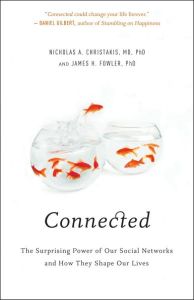Únase a getAbstract para acceder al resumen.

Únase a getAbstract para acceder al resumen.
Nicholas A. Christakis and James H. Fowler
Connected
The Surprising Power of Our Social Networks and How They Shape Our Lives
Little, Brown US, 2009
¿De qué se trata?
Humans are social. The imperative to connect remains as strong in the Internet age as it was in the prehistoric era.
Recommendation
Individuals derive their identities from their social networks. By forging dynamic connections, people accomplish innumerable worthwhile activities, such as giving to charity and sharing knowledge. Unfortunately, social networks also can bring great harm to their members. Panics may reverberate across financial networks, quickly sending stock markets into death spirals and shutting down credit for businesses and consumers. Pathogens like the AIDS virus can sweep across sexual and other networks. In this book, acclaimed scientists and academics Nicholas A. Christakis and James H. Fowler explore the properties and capacities of social networks. They present their findings about how and why people connect. getAbstract recommends their analysis to sociology and psychology buffs, as well as to managers and marketers who would like to develop more insight into how to take advantage of social networks.
Summary
About the Authors
Nicholas A. Christakis, M.D., Ph.D., is a professor at Harvard University. Time magazine named him one of 2009’s 100 most influential people in the world. James H. Fowler, Ph.D., is an associate professor at the University of California, San Diego.
















Comment on this summary